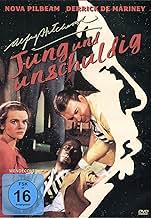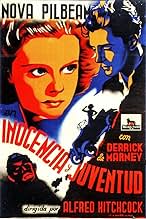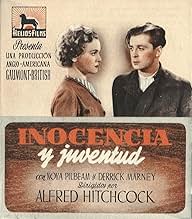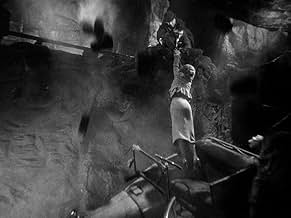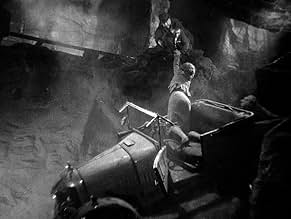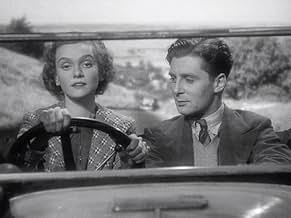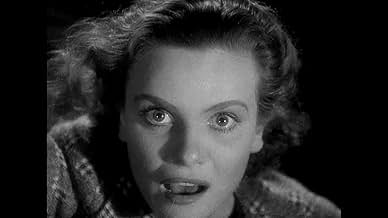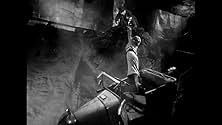CALIFICACIÓN DE IMDb
6.8/10
12 k
TU CALIFICACIÓN
Un hombre se da a la fuga al ser acusado de asesinato y pone en riesgo a una bella desconocida por su causa.Un hombre se da a la fuga al ser acusado de asesinato y pone en riesgo a una bella desconocida por su causa.Un hombre se da a la fuga al ser acusado de asesinato y pone en riesgo a una bella desconocida por su causa.
- Dirección
- Guionistas
- Elenco
- Premios
- 1 premio ganado en total
Derrick De Marney
- Robert Tisdall
- (as Derrick de Marney)
Frank Atkinson
- Petrol Pump Attendant
- (sin créditos)
Clive Baxter
- Burgoyne Boy
- (sin créditos)
Pamela Bevan
- Little Girl at Party
- (sin créditos)
Ernest Borrow
- Policeman Outside Courtroom
- (sin créditos)
Opiniones destacadas
Hitchcock is in a class by himself. I'll give any of his films multiple viewings. The story and structure of "Young and Innocent" resemble "The 39 Steps," with a young woman helping a young man on the run thwart the police and prove his innocence. This film is a standout, though, not because of the story or acting (both charming), but because of a virtuoso bit of directing by the Master, in which the location of the killer is revealed. As I watched the scene unfold for the first time, I remember thinking, "This is what makes Hitchcock Hitchcock." I wish I had never seen any Hitchcock films so I could watch them all again for the first time. His is a brilliant body of work, and this is an often overlooked example of his mastery of the film art.
"Young and Innocent" is one of the best of Alfred Hitchcock's pre-Hollywood movies. It contains all of the features that characterized the finest of his British movies, and is (as many others have commented) a film often undeservedly overlooked amongst Hitchcock's large collection of classics.
The actors would all be unfamiliar to most contemporary American viewers, but it is a fine cast that does full justice to a good story, and that responds well to Hitchcock's expert direction. Derrick de Marney is engaging as the unjustly accused hero Robert Tisdall, and his character is balanced nicely by good performances from the rest of the cast (several of whom appeared in more than one of Hitchcock's British movies).
As is often the case with Hitchcock's British pictures, the title is capable of multiple interpretations. At the least, it could refer either to the hero, to the heroine, or to the overall atmosphere and themes of the movie. Young Tisdall is being chased by the law, but we know from the beginning that he is innocent, and his knowledge of that innocence enables him to remain upbeat and even playful despite the dangers and complications he faces. Erica (Nova Pilbeam), his reluctant friend and helper, is innocent in a different sense. In the story she finds her youthful naivete, especially the assumptions she has acquired in growing up as a chief police constable's daughter, challenged by the real world - perhaps for the first time in her life. Pilbeam is not a glamorous heroine (and this may be one of the reasons why "Young and Innocent" is unjustly neglected), but she was a good choice to portray the youthful earnestness and resulting moral dilemmas of her character.
Despite the film's short length, it is filled with classic Hitchcock touches of detail, artistry, and humor, many of which are more low-key than those in his more familiar Hollywood films. It is worth watching several times in order to catch and appreciate all of the details. Three sequences are especially worth noting: (i) the renowned tracking shot at the climax of the film, which is not only a fine technical achievement but also an ideal way to set up the suspenseful conclusion; (ii) the birthday party in the middle, which encapsulates in very subtle ways most of the themes and contrasts of the movie, and (iii) the sequence towards the beginning involving the hero's conference with his lawyer, his court appearance, and his escape, a sequence which is filled with comic details too numerous to catch all at once (including one of the director's most humorous cameos).
Any Hitchcock fan should thoroughly enjoy "Young and Innocent". Beyond that, any fan of thrillers who can look past an unfamiliar cast, and who is willing to look for the subtle touches that characterized the great director's British work, will also find the film a satisfying experience.
The actors would all be unfamiliar to most contemporary American viewers, but it is a fine cast that does full justice to a good story, and that responds well to Hitchcock's expert direction. Derrick de Marney is engaging as the unjustly accused hero Robert Tisdall, and his character is balanced nicely by good performances from the rest of the cast (several of whom appeared in more than one of Hitchcock's British movies).
As is often the case with Hitchcock's British pictures, the title is capable of multiple interpretations. At the least, it could refer either to the hero, to the heroine, or to the overall atmosphere and themes of the movie. Young Tisdall is being chased by the law, but we know from the beginning that he is innocent, and his knowledge of that innocence enables him to remain upbeat and even playful despite the dangers and complications he faces. Erica (Nova Pilbeam), his reluctant friend and helper, is innocent in a different sense. In the story she finds her youthful naivete, especially the assumptions she has acquired in growing up as a chief police constable's daughter, challenged by the real world - perhaps for the first time in her life. Pilbeam is not a glamorous heroine (and this may be one of the reasons why "Young and Innocent" is unjustly neglected), but she was a good choice to portray the youthful earnestness and resulting moral dilemmas of her character.
Despite the film's short length, it is filled with classic Hitchcock touches of detail, artistry, and humor, many of which are more low-key than those in his more familiar Hollywood films. It is worth watching several times in order to catch and appreciate all of the details. Three sequences are especially worth noting: (i) the renowned tracking shot at the climax of the film, which is not only a fine technical achievement but also an ideal way to set up the suspenseful conclusion; (ii) the birthday party in the middle, which encapsulates in very subtle ways most of the themes and contrasts of the movie, and (iii) the sequence towards the beginning involving the hero's conference with his lawyer, his court appearance, and his escape, a sequence which is filled with comic details too numerous to catch all at once (including one of the director's most humorous cameos).
Any Hitchcock fan should thoroughly enjoy "Young and Innocent". Beyond that, any fan of thrillers who can look past an unfamiliar cast, and who is willing to look for the subtle touches that characterized the great director's British work, will also find the film a satisfying experience.
Young and Innocent (1937)
The title is appropriate to the point of being redundant, because in nearly every Alfred Hitchcock film the key theme is an innocent man accused. In this case, accused of murder, and the young man is a charming English actor, Derrick De Marney. As the police begin their hunt, he runs into the police chief's daughter, played by Nova Pilbeam, a tomboyish answer to Katherine Hepburn, and the real star of the movie.
This is a late British Hitchcock film, and it feels slightly raw around the edges, but it's so fast and likable and well constructed, you have to love it. In fact, the suspense of getting caught is balanced by some downright slapstick scenes that are brief and hilarious. And a reminder that this is a romp, the whole thing a beautiful, spritely entertainment. Never mind a killer is on the loose, because if one man is innocent of murder, another, out there somewhere, it not.
This is 1937, and by 1939 Hitchcock has moved to the U.S. to do Hollywood movies (including the amazing Rebecca in 1940), and so Young and Innocent and The Lady Vanishes (which has a similar quaint feel) wrap up his long British period. It says a lot for a movie to say I could watch it again, not because it's technically astonishing, but because it's just a joy, and very sweet. Never mind a little corniness or an inevitable ending, it's good!
The title is appropriate to the point of being redundant, because in nearly every Alfred Hitchcock film the key theme is an innocent man accused. In this case, accused of murder, and the young man is a charming English actor, Derrick De Marney. As the police begin their hunt, he runs into the police chief's daughter, played by Nova Pilbeam, a tomboyish answer to Katherine Hepburn, and the real star of the movie.
This is a late British Hitchcock film, and it feels slightly raw around the edges, but it's so fast and likable and well constructed, you have to love it. In fact, the suspense of getting caught is balanced by some downright slapstick scenes that are brief and hilarious. And a reminder that this is a romp, the whole thing a beautiful, spritely entertainment. Never mind a killer is on the loose, because if one man is innocent of murder, another, out there somewhere, it not.
This is 1937, and by 1939 Hitchcock has moved to the U.S. to do Hollywood movies (including the amazing Rebecca in 1940), and so Young and Innocent and The Lady Vanishes (which has a similar quaint feel) wrap up his long British period. It says a lot for a movie to say I could watch it again, not because it's technically astonishing, but because it's just a joy, and very sweet. Never mind a little corniness or an inevitable ending, it's good!
I hold with what seems to be the majority opinion here, i.e. that this early Hitchcock effort is a neglected gem. Though certainly not as well-done as some of his more noteworthy movies, I found it to be thoroughly captivating and entertaining, with the blend of suspense and humor that one finds in, say, "To Catch a Thief" or "Family Plot". Derrick deMarney as the romantic lead does a particularly fine job; sort of a foreshadowing of the kind of thing Cary Grant later did so well.
One thought is that the title is perhaps a bit of a double entendre; we always associate the phrase "Young and Innocent" with a female, but the story is really about the attempt of the lead character - a young man - to prove his innocence. Then again, is he really the lead, or is the story about the girl after all? I'm sure Hitch intended this touch of ambiguity.
Once again I have to thank American Movie Classics for bringing us another worthy movie from the past. Hitchcock fans should not miss this one (come to think of it, the only dog that I have seen from Hitch is "The Paradine Case").
One thought is that the title is perhaps a bit of a double entendre; we always associate the phrase "Young and Innocent" with a female, but the story is really about the attempt of the lead character - a young man - to prove his innocence. Then again, is he really the lead, or is the story about the girl after all? I'm sure Hitch intended this touch of ambiguity.
Once again I have to thank American Movie Classics for bringing us another worthy movie from the past. Hitchcock fans should not miss this one (come to think of it, the only dog that I have seen from Hitch is "The Paradine Case").
Another wrongfully-accused-man-on-the-run tale from Hitchcock, this time starring Derrick De Marney as a singer accused of murder. He escapes custody with hopes of clearing his name, and gets some unexpected help from Erica (Nova Pilbeam), the daughter of a police inspector. With Percy Marmont, John Longden, Edward Rigby, Mary Clare, Basil Radford, George Curzon, George Merritt, Bill Shine, and Torin Thatcher.
This was becoming well-trod territory for Hitchcock even back in '37, and De Marney & Pilbeam don't quite have the screen charisma of Donat & Carroll, but this is still enjoyable if one keeps their expectations in check. There's some miniature work featuring some trains and cars, and suspenseful mine collapse. The finale, with a band in blackface, may keep this one on the lesser-shown list. Pilbeam was 17 when this was filmed, while her romantic onscreen partner De Marney was 31.
This was becoming well-trod territory for Hitchcock even back in '37, and De Marney & Pilbeam don't quite have the screen charisma of Donat & Carroll, but this is still enjoyable if one keeps their expectations in check. There's some miniature work featuring some trains and cars, and suspenseful mine collapse. The finale, with a band in blackface, may keep this one on the lesser-shown list. Pilbeam was 17 when this was filmed, while her romantic onscreen partner De Marney was 31.
¿Sabías que…?
- TriviaAlfred Hitchcock: Outside the courthouse holding a camera as Robert Tisdall (Derrick De Marney) escapes (at about 0:16:10).
- Errores(at around 50 mins) When Erica Burgoyne and Robert Tisdall have taken refuge at night in a small town by parking her car next to a siding just before where the railroad underpasses a bridge, the entire scene has been staged and shot as an obvious miniature as revealed by three mistakes:
- the somewhat jerky motion and unnatural lighting of an automobile (indicating that it was pulled) as it moves across the bridge above the railroad
- the express train speeding under the bridge drags a length of cord behind it as it disappears from view
- the camera tracking in closer to the parked automobile hidden in the shelter of freight trains on sidings reveals that the figures of Erica and Robert are actually modeled and painted figurines, motionless until the shot suddenly changes to a medium closeup shot of the two actors.
- Citas
[last lines]
Erica Burgoyne: Father, don't you think we ought to ask Mr. Tisdall to dinner?
- ConexionesFeatured in Reputations: Hitch: Alfred the Great (1999)
- Bandas sonorasNo One Can Like the Drummer Man
(uncredited)
Written by Samuel Lerner (as Lerner), Al Goodhart (as Goodhart) and Al Hoffman (as Hoffman)
Selecciones populares
Inicia sesión para calificar y agrega a la lista de videos para obtener recomendaciones personalizadas
Detalles
Taquilla
- Total a nivel mundial
- USD 401
- Tiempo de ejecución1 hora 20 minutos
- Color
- Relación de aspecto
- 1.37 : 1
Contribuir a esta página
Sugiere una edición o agrega el contenido que falta

